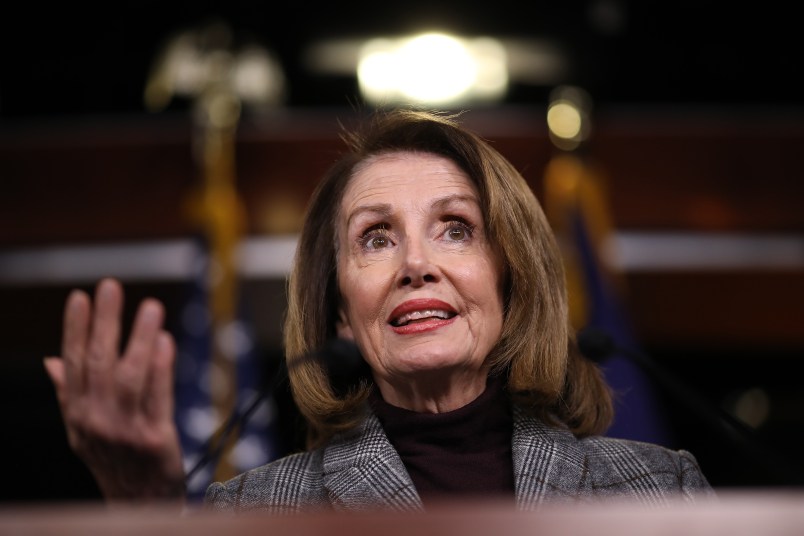House Speaker Nancy Pelosi (D-CA) wants to make sure her members keep pushing to see the full Mueller report — and fire back on arguments that it exonerates Trump.
Pelosi sent talking points to House Democratic offices Monday afternoon suggesting they demand all documents relating to the investigation.
“The Mueller report expressly does not exonerate the President. Instead, it ‘sets out evidence on both sides of the question’ of obstruction – including the evidence that President Trump attempted to obstruct justice. The assertion that there is ‘no collusion’ is an incorrect overstatement of the Special Counsel’s report,” one talking point reads.
The remarks are largely in line with what Pelosi herself has said publicly since Attorney General William Barr put out his summary of Mueller’s report on Sunday afternoon.
Here are the talking points Pelosi’s office sent to House Democrats:

Talking Points: House Democrats Call for Full Mueller Report & Findings to be Released
Mueller Report & Findings Must be Made Public to the American People & the Congress
Attorney General Barr’s letter raises as many questions as it answers. The full report and its underlying documentations must be made public immediately to ensure Congress and the American people can judge the facts for themselves.
- This transparency is necessary to ensure the American people have confidence in the integrity of the investigation, and that the government remains accountable to the people. We cannot simply rely on what may be a partisan interpretation of facts uncovered during the course of a 22-month review of possible wrongdoing by the President.
- Congress has the authority to see and evaluate the underlying evidence. Making the report public is consistent with the intent of the Special Counsel Regulations, past precedent and, most importantly, the interests of the American public.
The Mueller report expressly does not exonerate the President. Instead, it “sets out evidence on both sides of the question” of obstruction – including the evidence that President Trump attempted to obstruct justice. The assertion that there is “no collusion” is an incorrect overstatement of the Special Counsel’s report.
- The fact that Special Counsel Mueller’s report does not exonerate the President on a charge as serious as obstruction of justice demonstrates how urgent it is that the full report and underlying documentation be made public immediately.
- AG Barr’s unsolicited audition letter to the Department of Justice, suggesting that the obstruction investigation was ‘fatally misconceived,’ calls into question his objectivity on this point in particular.
- AG Barr must immediately release the full report and the underlying documents so that the Committees can proceed with their independent work, including oversight and legislating to address any issues the Mueller report may raise.
The American people, Congress and President Trump agree that the Special Counsel’s report should be released in full to the public. Making Special Counsel Mueller’s report public is also consistent with the intent of the Special Counsel Regulations, past precedent, and most importantly, the interests of the American public.
- An overwhelming and bipartisan majority of Americans believe that the Special Counsel’s report should be made fully public. 81 percent of adults believe the report should be released, including 79 percent of Republicans.
- The House just unanimously voted 420-0 to make the full report and its findings public to Congress and to the American people.
- Transparency is consistent with the overall purpose and intent of the Special Counsel Regulations and the accompanying Department of Justice commentary, which notes the importance of ‘‘ensur[ing] congressional and public confidence in the integrity of the process. In the only other instance where a Special Counsel was appointed under the Special Counsel Regulations (in 1999, concerning the 1993 confrontation at the Branch Davidian complex in Waco, Texas), both the interim and final reports including findings by the Special Counsel were made public. As the Department of Justice made clear over the last two years, DOJ policy permits disclosure of investigative materials when it serves the public interest, even as they pertain to “‘uncharged third parties.”






